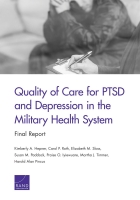| 来源类型 | Research Reports
|
| 规范类型 | 报告
|
| DOI | https://doi.org/10.7249/RR1542
|
| ISBN | 9780833097132
|
| 来源ID | RR-1542-OSD
|
| Quality of Care for PTSD and Depression in the Military Health System: Final Report |
| Kimberly A. Hepner; Carol P. Roth; Elizabeth M. Sloss; Susan M. Paddock; Praise O. Iyiewuare; Martha J. Timmer; Harold Alan Pincus
|
| 发表日期 | 2017
|
| 出版年 | 2017
|
| 页码 | 212
|
| 语种 | 英语
|
| 结论 |
- The MHS performed well in providing initial screening for suicide and substance use, but needs to improve at providing adequate follow-up to service members with suicide risk.
- Most service members with PTSD or depression received at least some psychotherapy, but fewer received psychotherapy that was evidence-based.
- Service members with PTSD or depression use a high volume of health services and see multiple providers, suggesting the need to ensure coordination of care.
- The MHS continues to be a leader in achieving high rates of follow-up after psychiatric hospitalization.
- Less than half of service members receive an adequate amount of initial care when beginning treatment for PTSD or depression.
- Army demonstrated increased outcome monitoring over time and preliminary analyses suggest that more effort is needed to ensure service members who receive care achieve positive outcomes.
- Performance on most administrative data–based quality measures improved slightly between 2012–2013 and 2013–2014, but targeted efforts are needed to support further improvements.
- Quality of care for PTSD and depression varied by service branch, TRICARE region, and service member characteristics, suggesting opportunities for quality improvement.
|
| 摘要 |
- Improve the quality of care delivered by the Military Health System for psychological health conditions by immediately focusing on specific care processes identified for improvement.
- Expand efforts to routinely assess quality of psychological health care: Establish an enterprise-wide performance measurement, monitoring, and improvement system that includes high-priority standardized measures to assess care for psychological health conditions; and routinely report quality measure scores for psychological health conditions internally, enterprise-wide, and publicly to support and incentivize ongoing quality improvement and facilitate transparency.
- Expand efforts to monitor and use treatment outcomes for service members with psychological health conditions: Integrate routine outcome monitoring for service members with PH conditions as structured data in the medical record as part of a measurement-based care strategy; monitor implementation of outcome monitoring across service branches and evaluate how providers use symptom data to inform clinical care; and build strategies to effectively use outcome data and address the limitations of these data.
- Investigate the reasons for significant variation in quality of care for PH conditions by service branch, region, and service member characteristics.
|
| 主题 | Depression
; Health Care Quality Measurement
; Mental Health Treatment
; Military Health and Health Care
; Posttraumatic Stress Disorder
|
| URL | https://www.rand.org/pubs/research_reports/RR1542.html
|
| 来源智库 | RAND Corporation (United States)
|
| 引用统计 |
|
| 资源类型 | 智库出版物
|
| 条目标识符 | http://119.78.100.153/handle/2XGU8XDN/108455
|
推荐引用方式
GB/T 7714 |
Kimberly A. Hepner,Carol P. Roth,Elizabeth M. Sloss,et al. Quality of Care for PTSD and Depression in the Military Health System: Final Report. 2017.
|
|
文件名:
|
1501867043742.jpg
|
|
格式:
|
JPEG
|

|
文件名:
|
RAND_RR1542.pdf
|
|
格式:
|
Adobe PDF
|
除非特别说明,本系统中所有内容都受版权保护,并保留所有权利。